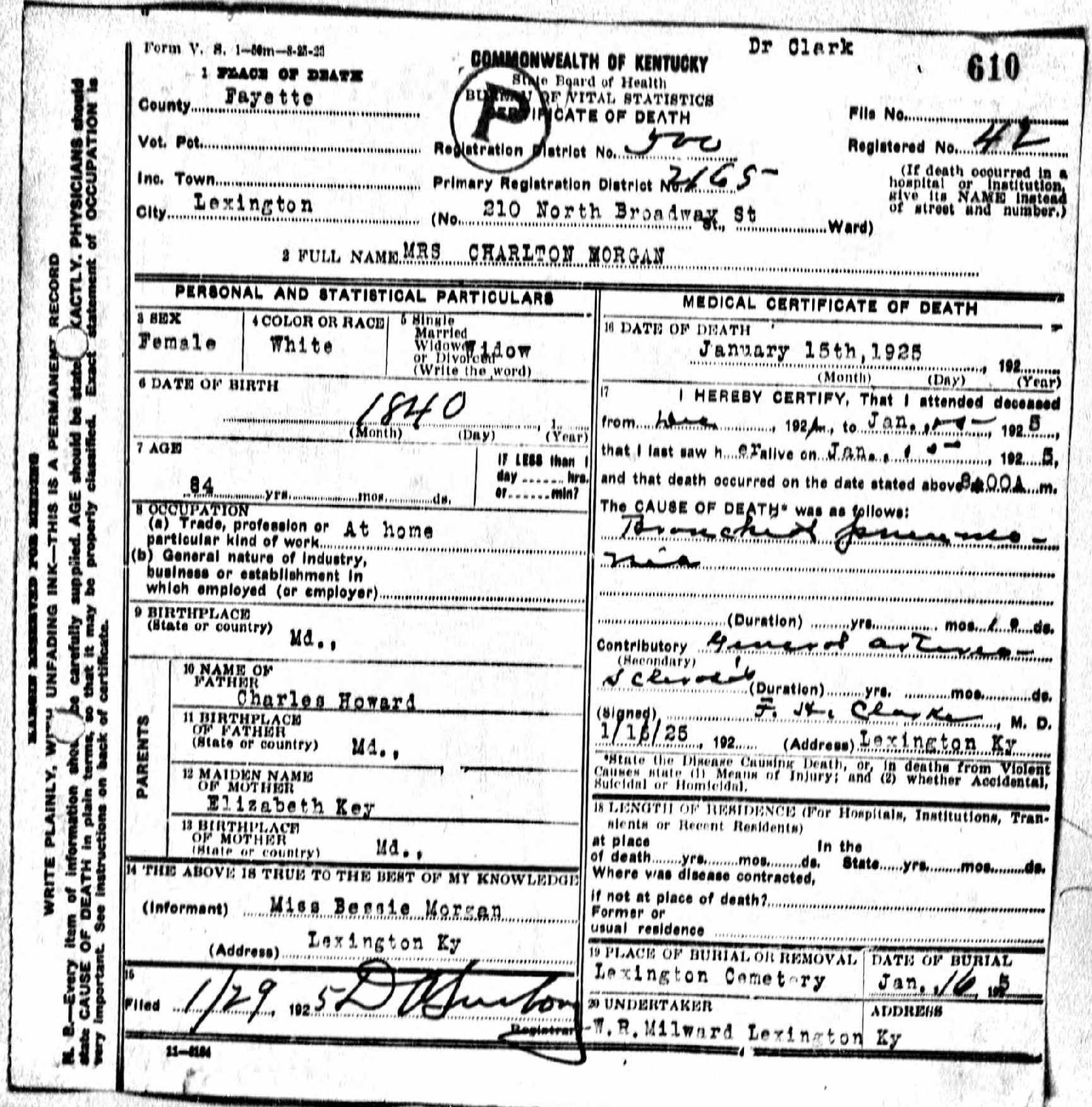
Chart of How...

DeathCert-Mo...

Ancestors-Wi...

Charles was born on 25 APR 1802 in Baltimore, Maryland, the son of John Eager Howard and Margaret Oswald Chew.
He died on 18 JUN 1869 in Oakland, Maryland.
His wife was Elizabeth Phoebe Key, who he married on 9 NOV 1825 in Georgetown, Bourbon County Kentucky. Their ten known children were Frank Key (1826-1872), John Eager (1828-1911), Mary Lloyd (1831-1923), Charles (1830-1895), James (1832-1910), Alice (1836-?), Edward Lloyd (1837-1881), McHenry (1839-1923), Ellen Lloyd (1840-1925) and Elizabeth S (1842-?).
| | | |||||||
| | ||||||||
| | | |||||||
| | ||||||||
| | ||||||||
| | ||||||||
| | ||||||||
| |
| Event | Date | Details | Source | Multimedia | Notes | ||||||||
|---|---|---|---|---|---|---|---|---|---|---|---|---|---|
| Birth | 25 APR 1802 |
|
|||||||||||
| Death | 18 JUN 1869 |
|
|||||||||||
| Census | 23 OCT 1850 |
|
|||||||||||
| Census | 7 JUN 1860 |
|
See Note 2 | ||||||||||
| Burial | JUN 1869 |
|
 Chart of How... |
 DeathCert-Mo... |
 Ancestors-Wi... |
Note 1
Charles Howard (1802–1869) m.1825 Elizabeth Key (dau. of Francis Scott Key). Charles and his son, Francis Key Howard, were imprisoned in Fort McHenry at the start of the American Civil War
Frank Key Howard (October 25, 1826 – May 29, 1872)[1] (also cited as Francis Key Howard)[2][3] was the grandson of Francis Scott Key and Revolutionary War colonel John Eager Howard. Howard was the editor of the Daily Exchange, a Baltimore newspaper sympathetic to the Confederacy.[4] He was arrested without a warrant just after midnight on September 13, 1861 at his home by U.S. Major General Nathaniel Prentice Banks on the direct orders of General George B. McClellan enforcing the policy of President Abraham Lincoln. (In his book he writes that he was told by the arresting officer that the order had come from Secretary of State William Seward.[5]) The basis for his arrest was for writing a critical editorial in his newspaper of Lincoln's suspension of the writ of habeas corpus, and criticizing the fact that the Lincoln administration had declared martial law in Baltimore and imprisoned without charge George William Brown, the mayor of Baltimore, sitting U.S. Congressman Henry May, all the police commissioners of Baltimore, and the entire city council.[6] Lincoln's suspension of habeas corpus in Maryland had already been declared unconstitutional by U.S. Supreme Court Chief Justice Roger Taney (Howard's great-uncle by marriage) in Ex parte Merryman, but Lincoln had ignored the federal court ruling. Howard was initially confined to Fort McHenry, the same fort his grandfather Francis Scott Key saw withstand a British bombardment during the War of 1812, which inspired him to write "The Star-Spangled Banner", which would become the national anthem of the United States of America. He was then transferred first to Fort Lafayette in Lower New York Bay off the coast of Brooklyn, then Fort Warren in Boston.
He wrote a book on his experiences as a political prisoner completed in December 1862 and published in 1863 titled Fourteen Months in American Bastiles,[7][8][5] two of the publishers selling the book were then arrested.[9] Howard commented on his imprisonment,
When I looked out in the morning, I could not help being struck by an odd and not pleasant coincidence. On that day forty-seven years before my grandfather, Mr. Francis Scott Key, then prisoner on a British ship, had witnessed the bombardment of Fort McHenry. When on the following morning the hostile fleet drew off, defeated, he wrote the song so long popular throughout the country, "The Star-Spangled Banner". As I stood upon the very scene of that conflict, I could not but contrast my position with his, forty-seven years before. The flag which he had then so proudly hailed, I saw waving at the same place over the victims of as vulgar and brutal a despotism as modern times have witnessed.
Howard died while in London in 1872.[
Note 2
brother-in-law Charles H Key and family very close, dwelling 226, family 216